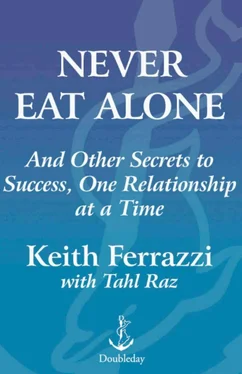Keith Ferrazzi - Never Eat Alone
Здесь есть возможность читать онлайн «Keith Ferrazzi - Never Eat Alone» весь текст электронной книги совершенно бесплатно (целиком полную версию без сокращений). В некоторых случаях можно слушать аудио, скачать через торрент в формате fb2 и присутствует краткое содержание. Год выпуска: 2005, ISBN: 2005, Издательство: C U R R E N C Y • D O U B L E D A Y, Жанр: marketing, на английском языке. Описание произведения, (предисловие) а так же отзывы посетителей доступны на портале библиотеки ЛибКат.
- Название:Never Eat Alone
- Автор:
- Издательство:C U R R E N C Y • D O U B L E D A Y
- Жанр:
- Год:2005
- ISBN:0-385-51529-4
- Рейтинг книги:4 / 5. Голосов: 1
-
Избранное:Добавить в избранное
- Отзывы:
-
Ваша оценка:
- 80
- 1
- 2
- 3
- 4
- 5
Never Eat Alone: краткое содержание, описание и аннотация
Предлагаем к чтению аннотацию, описание, краткое содержание или предисловие (зависит от того, что написал сам автор книги «Never Eat Alone»). Если вы не нашли необходимую информацию о книге — напишите в комментариях, мы постараемся отыскать её.
Never Eat Alone — читать онлайн бесплатно полную книгу (весь текст) целиком
Ниже представлен текст книги, разбитый по страницам. Система сохранения места последней прочитанной страницы, позволяет с удобством читать онлайн бесплатно книгу «Never Eat Alone», без необходимости каждый раз заново искать на чём Вы остановились. Поставьте закладку, и сможете в любой момент перейти на страницу, на которой закончили чтение.
Интервал:
Закладка:
George, for example, is a smart guy in his twenties who was introduced to me through a mutual friend. George worked in public relations in New York and aspired to start his own PR business. He asked me to lunch one day looking for advice and encouragement.
Ten minutes after we sat down, I knew he was on the wrong track.
"Have you started to reach out to potential clients?" I asked. "No," he told me. "I'm taking it step by step. My plan is to work my way up in my current company to a point where I can afford to leave. Then I'll incorporate, get an office, and start searching for my first customers. I don't want to start meeting with potential clients until I can present myself as a credible PR person with my own firm."
"You've got it totally backwards," I told him. "You're setting yourself up for failure."
My advice was to start finding future clients today. Had he thought about what kind of industry he wanted to specialize in? Had he thought about where the top people in that industry hang out? Once he could answer those questions, the next step was to go hang with this new circle of people.
"The most important thing is to get to know these people as friends, not potential customers," I said. "Though you're right about one thing: No matter how friendly you are, if the people you approach are any good at what they do, they won't hire you right off the bat to do their PR. Which is why you should offer your services for free—at least at first. For instance, maybe you can volunteer your time to a nonprofit organization they're involved in, or aid in publicizing a school fundraiser their kids are involved in."
"But won't my employer be angry at my expending so much energy on other things?" George asked.
"Doing good work for your employer comes first," I told him. "Finding time to manage your outside work is your responsibility. Concentrate on an industry that your present employer doesn't service. Remember, if you haven't done the necessary legwork on the day you decide to open your own business, you'll be back at your old job in no time flat."
"So I should work for these people for/ree?"
"Absolutely," I said. "Today you are unproven, and breaking in is tough. Eventually you'll have a growing circle of people who have seen your work and who believe in you. That's the kind of connections you're looking to create if you're going to start a business, or if you're looking to change jobs or careers."At some point, while you're still working for your current employer, start looking to turn one of your contacts into a real, paying client. Once you've got an established client that will provide references and create some word-of-mouth, you're halfway home. Then, and only then, is it time to go back to your company and ask to go half time, or better yet, turn them into your second big client. If you quit at that point, you've hedged your bets. You have a group of people who will help transition you into a new career."
The last half hour of our lunch was spent thinking about all the people he already knew who could help him get started. I offered a name or two from my own network, and George's confidence started to soar. I'm confident that now, when he reaches out, his interactions won't be tainted by desperation. He'll be looking for ways to help others, and everyone can benefit from a little bit of that.
The ideas behind starting a business aren't that different from the ideas that will make you a hot commodity within your company—not to mention give you job security. I know that's hard to believe given the current job environment. According to a recent study of business school programs, the percentage of MBAs in 2004 who were without a job three months after graduation tripled from the year before to an alarming 20 percent. Scores of people are out of work or living in dread that the ax will fall on their heads. A blizzard of pink slips has convinced job seekers that they must do more than scan the help-wanted ads or send resumes.
Too often, we get caught up efficiently doing ineffective things, focusing solely on the work that will get us through the day. The idea isn't to find oneself another environment tomorrow—be it a new job or a new economy—but to be constantly creating the environment and community you want for yourself, no matter what may occur.
Creating such a community, however, is not a short-term solution or one-off activity only to be used when necessary. The dynamics of building a relationship is necessarily incremental. You can only truly gain someone's trust and commitment little by little over time.
Right now, there are countless ways you can begin to create the kind of community that can help further your career. You can: (1) create a company-approved project that will force you to learn new skills and introduce you to new people within your company; (2) take on leadership positions in the hobbies and outside organizations that interest you; (3) join your local alumni club and spend time with people who are doing the jobs you'd like to be doing; (4) enroll in a class at a community college on a subject that relates to either the job you're doing now or a job you see yourself doing in the future.
All of these suggestions will help you meet new people. And the law of probability ensures that the more new people you know, the more opportunities will come your way and the more help you'll get at critical junctures in your career.
My first year in business school, I started consulting with my friend Tad Smith, who is now President of the Media Division at the large magazine publishing company Reed Business Information. The idea wasn't to create a sustainable consulting company that we would run after school. Instead, we wanted to offer our knowledge and work ethic to small companies for cut-rate prices. In exchange, we'd learn about new industries, gain real-world skills, and have a list of references and contacts when we graduated, as well as make some ready cash.
What about the world you inhabit right now? Are you making the most of the connections you already have?
Imagine, for a moment, that all your family and friends and associates are a part of a garden. Take a stroll through that relationship garden. What do you see?
If you're like most people, you see a tiny parcel of cleanly cut grass that represents the usual suspects of an ordinary Rolodex. It consists of your immediate friends, coworkers, and business partners: the most obvious people.
Your real network, however, is an overgrown jungle with an infinite variety of hidden nooks and crannies that are being neglected.
Your potential for connecting is at this moment far bigger than you realize. All around you are golden opportunities to develop relationships with people you know, who know people you don't know, who know even more people.
There are a number of things that you can do to harness the power of your preexisting network. Have you investigated the friends and contacts of your parents? How about your siblings? Your friends from college and grad school? What about your church, bowling league, or gym? How about your doctor or lawyer or realtor or broker?
In business, we often say that your best customers are the customers you have now. In other words, your most successful sales leads come from the selling you've already done. The highest returns don't come from new sales; they come on top of the customer base you've already established. It's easiest to reach out to those people who are at least tangentially part of your network.
The big hurdles of networking revolve around the cold calls, meeting of new people, and all the activities that involve engaging the unknown. But the first step has nothing to do with strangers; you should start connecting with the people you do know.
Focus on your immediate network: friends of friends, old acquaintances from school, and family. I suspect you've never asked your cousins, brothers, or brothers-in-law if they know anyone that they could introduce you to to help fulfill your goals.
Читать дальшеИнтервал:
Закладка:
Похожие книги на «Never Eat Alone»
Представляем Вашему вниманию похожие книги на «Never Eat Alone» списком для выбора. Мы отобрали схожую по названию и смыслу литературу в надежде предоставить читателям больше вариантов отыскать новые, интересные, ещё непрочитанные произведения.
Обсуждение, отзывы о книге «Never Eat Alone» и просто собственные мнения читателей. Оставьте ваши комментарии, напишите, что Вы думаете о произведении, его смысле или главных героях. Укажите что конкретно понравилось, а что нет, и почему Вы так считаете.












